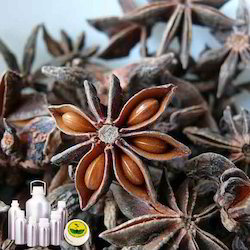Botonical Name | : | Pimpinella anisum | |
CAS # | : | 8007-70-3 | |
Country of Origin | : | India | |
Color & Odor | : | Colorless to pale yellow and spicy, sweet licorice-like scent odor | |
Solubility | : | Soluble in Alcohols & Essential Oils and insoluble in water | |
Specific Gravity | : | 0.978 - 0.994 @ 20ºC | |
Optical Rotation | : | -1º - +1º | |
Refractive Index | : | 1.552 - 1.561 @ 20ºC | |
Flash Point | : | 94°C | |
Major Constituents | : | Anethole 50-85% | |
Plant Part Used | : | Seeds | |
Extraction Method | : | Steam Distillation |
DESCRIPTION:
Aniseed oil is extracted from seeds of herb Pimpinella anisum (also known as P. officinale & vulgare), of Umbelliferae family. It has pungent liquorice-like smell & is also known by the name of as anise and sweet cumin. Its unique properties make it blend well all essential oils. CONSTITUENTS:
a-pinene, b-pinene, camphene, linalool, trans-anethole, cis-anethole, safrole, acetoanisole and anisaldehyde. AROMATIC SUMMARY / NOTE / STRENGTH OF AROMA:
Aniseed has a spicy, sweet licorice-like scent BLENDS WITH:
Cardamom, cedarwood, caraway, coriander, fennel, dill, mandarin, rosewood and petitgrain. COMMON NAMES:
Karanja Seed Oil, Karanj Oil. USES:
Aniseed oil is useful in the treatment of muscular aches & pains, bronchitis, rheumatism, whooping cough, cramps, colic, flatulence, catarrh, indigestion and hangovers. Being a warm, spicy essential oil, it is also used in aromatherapy for easing the discomfort of introverted & fearful people, while also aiding digestion, boosting lungs & easing migraines and headaches. 


































